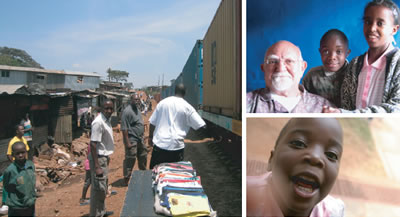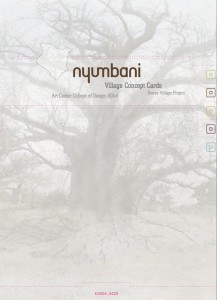The Nyumbani Village: A Community Response to the AIDS Pandemic
- Global Health
- Sustainable Development

Summer 2003
For more than 70 years, ArtCenter College of Design has been a world-wide leader in art and design education.
The work produced in many of the College’s disciplines — graphic design, transportation design, photography, illustration, film, environmental design, advertising, and product design—is internationally renowned for its peerless standards, and over many decades has had an immeasurable effect on the way we live. The College is a key advocate for the seminal role that designers and artists play in shaping all aspects of the world around us. In recognition of its outstanding contributions to society, Art Center College of Design was granted Non-Governmental Organization (NGO) status by the United Nations in June 2003.
Now, as part of fulfilling this expanded humanitarian responsibility, the College has become the lead design partner in a global coalition that has launched a unique project that will build a series of model communities throughout Africa. Nyumbani Village, the first of these in Kenya, will address one of the most serious consequences of the AIDS pandemic: the massive, growing and long term orphan crisis. AIDS is also having a devastating impact on the elderly—a highly neglected and vulnerable group in the crisis—who would typically rely on their grown children to help support them economically and physically.

Nyumbani, which means “home” in Swahili, will be a self-sustaining community that houses several hundred children and elders left homeless by the AIDS pandemic, by combining traditional support t systems with medical care, education and vocational training. The agricultural output of Nyumbani will not only sustain the basic needs of the Village residents, but will also provide a significant revenue stream for them. Additional economic enterprises will create revenue sources for the residents and for the operation of the Village. These enterprises will also provide a vital framework for the transfer of craftsmanship and other traditional skills from senior residents to younger generations, providing the orphaned children with a future means of livelihood. The Village will also be a “resource center” for the surrounding communities, and will foster improvement of public health and education access throughout the region.
The Nyumbani Village project presents Art Center with the opportunity to collaborate in an undertaking of immense importance and scale.
The plight of orphans and elders affected by HIV/AIDS and the far-reaching socio-economic ramifications of the disease require unique innovation and creative answers. Art Center’s professional faculty and students, and its long tradition of real-world engagement, make the College uniquely suited to embrace the multifaceted needs for the design over view and programmatic development of the master plan for the Village. Under the aegis of the humanitarian initiative Designmatters @ Art Center College of Design, the College is assembling a team of designers in many areas to address the wide-ranging requirements for the Village. An exemplary model will be set in place that provides for an innovative environmental framework and family support system to bolster community-based care for orphans and elders. The design elements of Nyumbani Village will cover a wide spectrum–from multiple structures that constitute the community’s housing and physical environment to educational and communication campaigns and product development.
Nyumbani Village is conceived to go beyond providing basic needs to its HIV/AIDS–affected residents; it will yield a pilot for similar endeavors. Over the next five years, and through a combination of private and public funding, Nyumbani Village International will build a series of intergenerational, self-sustained communities throughout Africa. These villages will provide a comprehensive, long term solution for orphans and elders who would otherwise be abandoned and forgotten. Life in these villages will become the positive alternative to the plight of the millions of abandoned children and elders now living in abject deprivation. The true value of design to society will be highly evident through these innovative new communities.
-

-
Nyumbani Village Concept Cards
The Nyumbani Village Concept Cards were developed to document research, findings and outcomes of the Nyumbani Village: Kenya project.
Published by Designmatters
Download PDF
